Tuesday’s general election tilted the Wyoming Legislature far enough to the right that once-fringe factions now threaten to seize power of one chamber from establishment Republicans.
That’s one outcome of voters purging non-Republicans from all but two of Wyoming’s 23 counties in the general election and thinning the ranks of moderate Republicans in the primary. Republican challengers unseated incumbent Reps. Andi LeBeau (D-Lander) and Chad Banks (D-Rock Springs), severing any threads of Democratic Party representation outside of Wyoming’s college town, Laramie, and its wealthy mountain resort community, Jackson Hole.
The party, once formidable in Wyoming, suffered wholesale losses: In 17 races Democrats failed to gain a single seat previously held by Republicans. With the defeat of Marshall Burt (L-Green River) and the departure of Rep. Jim Roscoe (I-Wilson), the 67th Wyoming Legislature’s 93 members will include zero minor party or unaffiliated politicians.
Republicans built on their supermajority and now have 86 lawmakers to the Democrat’s seven senators and representatives.
Although the Wyoming GOP now accounts for 92.5% of the statehouse, it’s far from a monolith. The fractured state of the party — and a growing cohort of Trump-aligned lawmakers perceived as far to the right — cast doubt on whether Republicans who’ve traditionally held power still have the ability to retain leadership of the House of Representatives.
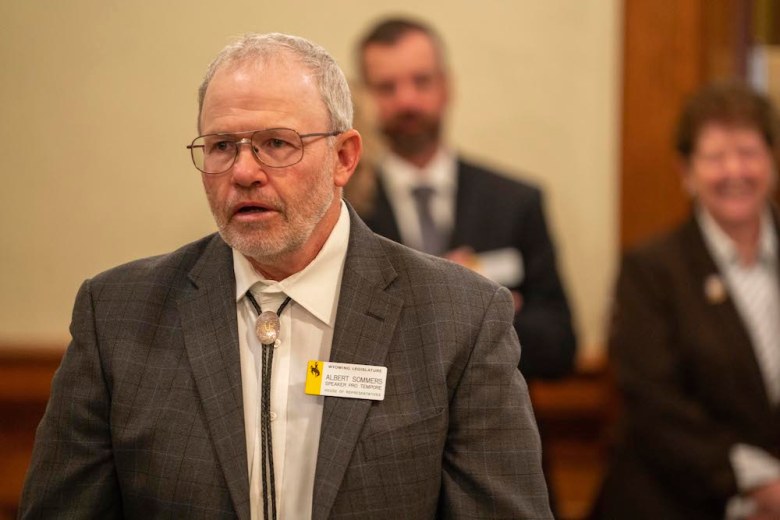
That’s the balance of power many are now wondering about, a half-dozen lawmakers told WyoFile.
Sen. Ogden Driskill (R-Devils Tower), the current Senate majority floor leader, is in a strong position to take the reins as the president of the upper chamber. But in the House, it’s less clear if Rep. Albert Sommers (R-Pinedale), the House majority floor leader, has enough support to ascend to speaker of the House. He faces a far-right speaker challenger: Rep. Mark Jennings (R-Sheridan), who’s affiliated with a bloc of representatives, the Wyoming House Freedom Caucus, that aims to dislodge what they perceive as moderate control of the House.

Whether or not Sommers or Jennings will get the nod depends on the political makeup of the reconstructed House, where close to half of representatives are new, said Sen. Mike Gierau (D-Jackson), who handily defeated a Republican challenger on Tuesday.
“How many people ran as right-wing, MAGA-loving, climate-denying, election-denying folks who were just saying it to get the gig, and are actually a little more moderate?” Gierau said.
The answer, he said, could tilt power one way or the other.
Sommers v. Jennings
Sommers, a 10-year veteran of the Legislature, said he will work hard to build allegiances with the body’s 61 other representatives in pursuit of his speaker bid.
“I’m going to have a letter going out to every representative,” Sommers said. “The essence of my pitch is that I have experience in leadership, I work well with people, I’m a hard worker, I believe in civility. The job is really about managing the Legislature and the House.”
Sommers didn’t speculate on how many people he has in his camp, nor did he identify representatives he perceives as undecided about leadership roles.
Jennings was confident that he’s already got the necessary support.
“We’re probably a little over that,” he said of the 29-vote threshold he’ll need to secure the nomination.
Jennings’ pitch to fellow lawmakers is that he’s not the establishment. Sommers, he acknowledged, is “in the pipeline” and is more experienced in the institutional side of the Legislature.
“But we’re a citizen Legislature, so it’s not all about the pipeline,” Jennings said. “The more moderates, a handful of them, have attempted to keep conservatives from the table, and the people of Wyoming have spoken with a pretty heavy mandate: They want to see us return.”
Nominees will be decided when House Republicans caucus on Nov. 19.
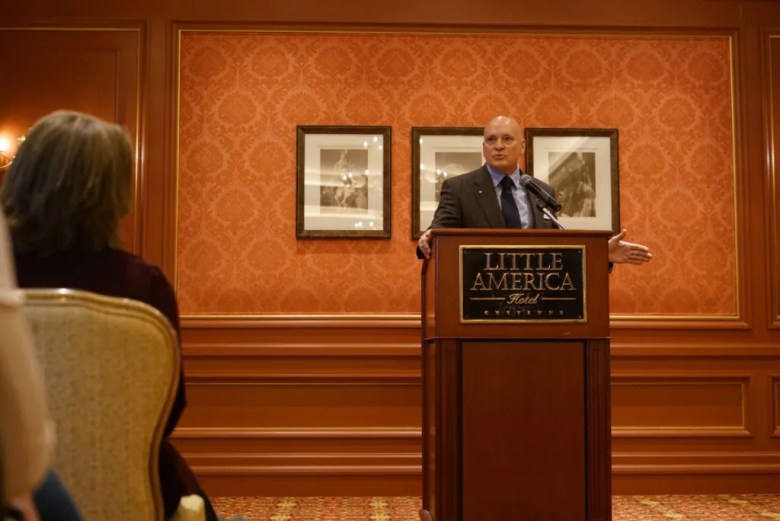
Rep. John Bear (R-Gillette), the Freedom Caucus chairman and a Jennings supporter, said there’s a “half a dozen or so” representatives who could go either way.
“I see the House as very split, as far as the Republican caucus right now, between the conservatives and the moderates,” Bear said.
The Freedom Caucus has operated mostly in secret, not disclosing its membership, though Bear said its leadership will soon be identifying themselves and operating more publicly. The 2020 election tripled its membership from six to 18. During the Legislature’s 2021 budget session the bloc amounted to 30% of the then 60-member lower chamber, which historically only has had one caucus under the Republican Party banner.
Tuesday’s general election grew the alternative caucus again: “We’ll be closer to a half in this term,” Bear said, “which is a significant move.”
Twenty-two of the House and Senate’s new members ran unopposed, though there was a failed write-in campaign mounted against Driskill. The Wyoming Senate also took a rightward step, though to a lesser extent.
Sen.-elect Dan Laursen (R-Powell), for example, hopped over from the House to take over the Bighorn Basin’s Senate District 19, formerly occupied by R.J. Kost. In Natrona County’s Senate District 29, Sen.-elect Bob Ide — who was present in the restricted area when a violent mob stormed the U.S. Capitol — takes over for Drew Perkins, who was defeated in the primary election.
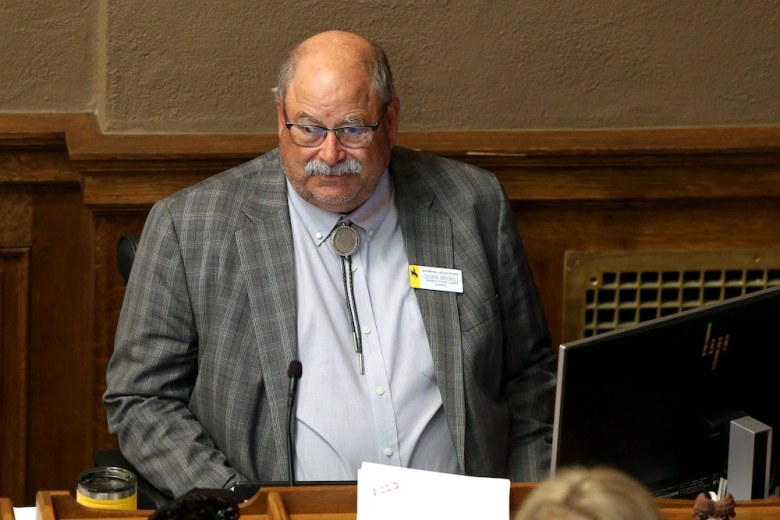
“It doesn’t take too many” seats, Gierau said, to swing the balance of power in the Senate. Still, he said, there are no other senators who appear to have enough support to challenge Driskill’s run at the president’s chair.
Move to the right
In the House, a non-traditional, far-right politician like Jennings assuming power could mean major changes to how the Legislature functions. The Senate president and speaker of the House play pivotal roles.
“You’re not in total control … [but] you’re like the manager, you’re like the head coach,” said Rep. Steve Harshman (R-Casper), a 20-year Legislature veteran and two-time House speaker.
Harshman is supporting Sommers.
“I think Albert will do great,” he said. “He’s experienced and he’s a Wyoming guy.”
The speaker of the house has a lot of discretionary power, deciding which committee bills get assigned where, or whether a bill is heard or assigned in the first place. Committee chairs and committee members are also determined by the speaker, including the powerful Joint Appropriations Committee, which sets the fiscal tone for the Legislature. Budget cuts are where Rep. Mike Yin (D-Jackson) sees the greatest potential policy difference between Sommers and Jennings.
“You’ll see more things being cut indiscriminately to match up with an unknown ideal,” Yin said, speaking to what might happen if Jennings prevails.
Sommers, a part of House leadership since 2018, is a Sublette County cattle rancher who currently sits on half a dozen committees, including Management Council, House Education, the Wyoming Wildlife Taskforce and Colorado River Basin Forum. He handily defeated a far-right challenger, La Barge oilman Mike Schmid, in the primary election.
Jennings, who lists his occupation as a “small business owner,” is in his third term in the Legislature and ran unopposed to keep his seat.
If he assumes the speaker role, there will be no retribution against establishment lawmakers who have held power, he said.
“We need everybody at the table to bring their ideas,” Jennings said. “Factionalism has not been good.”
Jennings’ voting record reflects the far-right bloc of representatives he’s aligned himself with. Last session he was part of a group of lawmakers who voted to reject $1 billion dollars in federal funding provided through the American Rescue Plan Act. Some lawmakers welcomed the relief, after budget cuts slashed state agencies in the early days of the pandemic, but several representatives — Jennings included — argued on the House floor to reject ARPA dollars in an act of their fiscal conservatism. Behind the scenes, several of those same lawmakers relied on financial relief from the federal government. Before the amendment to turn down $1 billion failed, Jennings made an impassioned plea.
“What would it look like if Wyoming took the lead and said, ‘You know what, we’re not taking any more of this money,’” Jennings said, adding that it would show the rest of the country that in Wyoming, “we actually love freedom more than we love the materialism.”
Lawmaking implications
The Legislature likely has more money to work with than expected — the biennium revenue forecast just jumped $739 million — but a hypothetical Jennings-led House could dash hopes of new revenue-raising bills, which must start in the lower chamber.
Regardless of leadership makeup, Sen. Cale Case (R-Lander), who chairs the Senate Revenue Committee, doesn’t expect that it will be a great year for revenue bills. Case also won reelection in Tuesday’s general election after running unopposed.
“There might be some exceptions,” he said. “The Republican Party has talked about taxation of renewables, for example, thinking that they need to be more on par with other resources, so there’s an opening there.”
Another Medicaid expansion bill will run, said Case, who added he’s “actually kind of optimistic.”
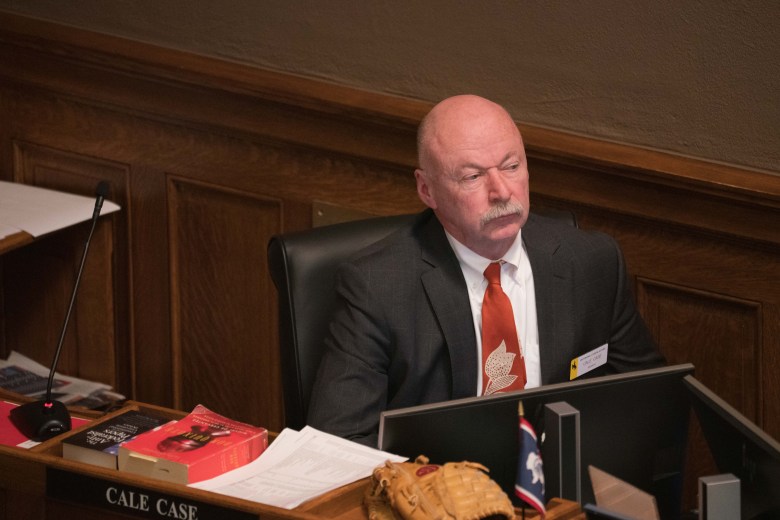
Case declined to speculate on what’s going to happen with leadership in the opposite chamber.
Whether Sommers or Jennings prevails hinges on upcoming votes.
Every lawmaker has a say in who gets to lead their respective chamber, regardless of party affiliation. After every general election in even-numbered years, lawmakers vote for House and Senate leadership positions on the first day of the general session, according to the Legislative Service Office. In the house that includes the positions of speaker and speaker pro tem, and president and vice president of the Senate.
However, nominees for those elections are decided in party caucuses ahead of the session, so only Republican lawmakers get to decide on Republican nominees. With a Republican supermajority in both chambers, that initial vote — behind closed doors in Casper on Nov. 19, Bear said — means a lot.
Republican members of the Legislature fill out a “secret ballot” nominating leadership during the caucus, Bear said.
Bear described the subsequent vote on the House floor as “ceremonial.” It’s the caucus vote, he said, that really matters, considering Republicans’ supermajority, and historically members honor the caucus winner — rendering the five Democrats’ votes moot.
“That’s a move I would support,” Bear said. “If Albert beats Mark, I would support Albert as the speaker.”
Harshman had a different read of the House floor vote’s significance.
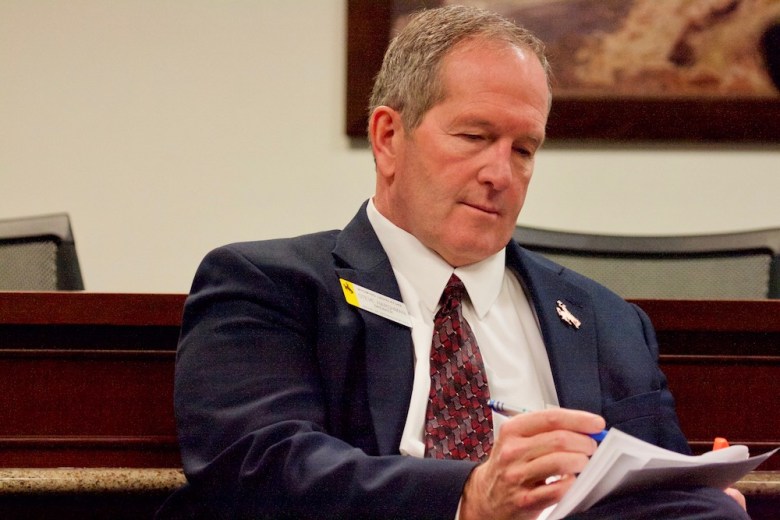
“The caucus thing is pretty recent, like in the last 20 years,” Harshman said. “For 100 years before that, I don’t think it was much of a thing — it was always decided on the floor.”
If representatives deviate from what’s decided in the caucus when they vote on the floor in January, the five Democrats could be a deciding factor.
Because Caucus voting relies on tradition and not codified rules such as statute, Yin said the path forward would not be clear.
“It may require more conversations, it may require another caucus,” Yin said. “I don’t know what that would look like.”


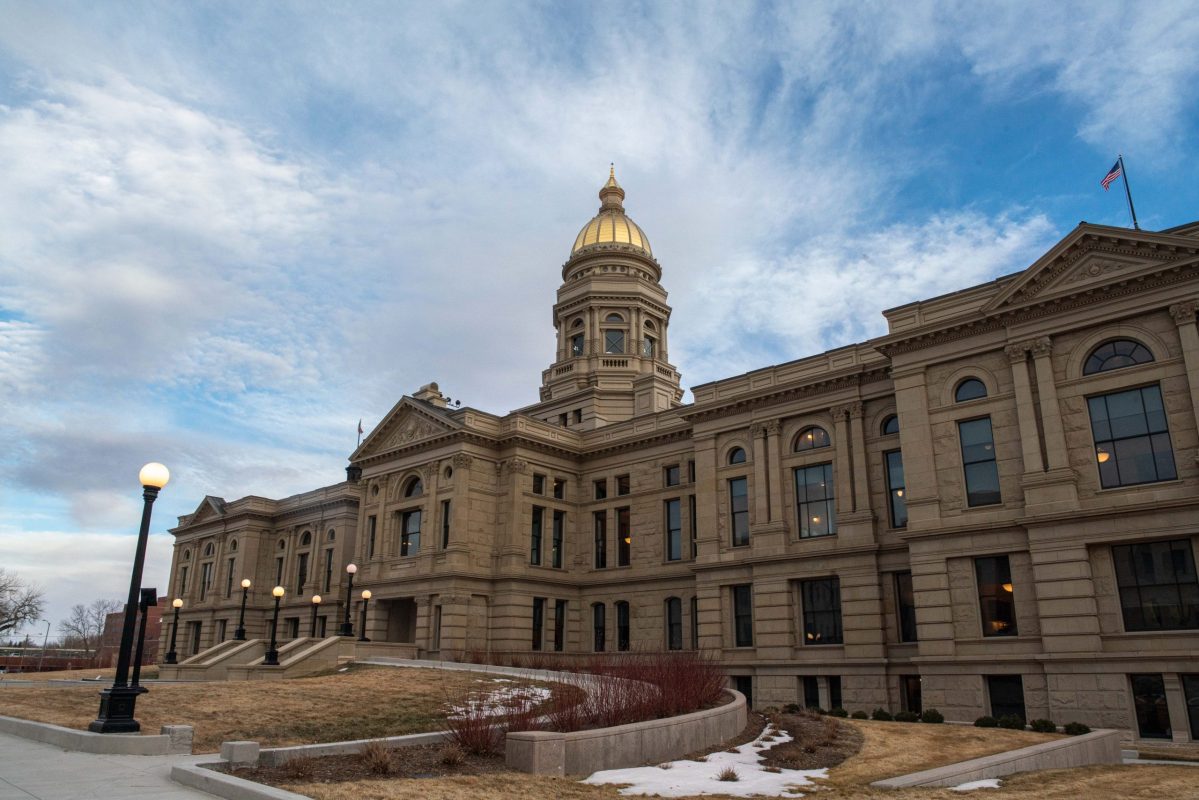
Trumpism is done, but Wyoming got left holding the Q-cumber. Sommer’s balance will be much more needed than a right-wing taliban.
Perhaps a better description of this split in the state Republican Party is the traditional conservatives versus the authoritarian fringe.
Medicaid expansion needs to be tackled. Enough of the excuses. Be better to your neighbors in need.
As a Sublette County voter who has seen Albert Sommers in action over many decades, I can testify to his steady, measured, thoughtful approach to issues in our county and state. He meets with any constituent, no matter their party or point of view and gives their concerns his sincere and focused attention. If the members of the Legislature want a leader who will respectfully work with all of them, not just those who share a particular philosophy, and has the best interests of our state at heart, Sommers is your man.
the 5 members in the minority party due have a vote for speaker.
those members can vote for either republican nominee.
although a very small minority in a close election,their vote could be significant.
i will go out on a limb & say rge minority will vote for sommers hoping for a few rewards in return !